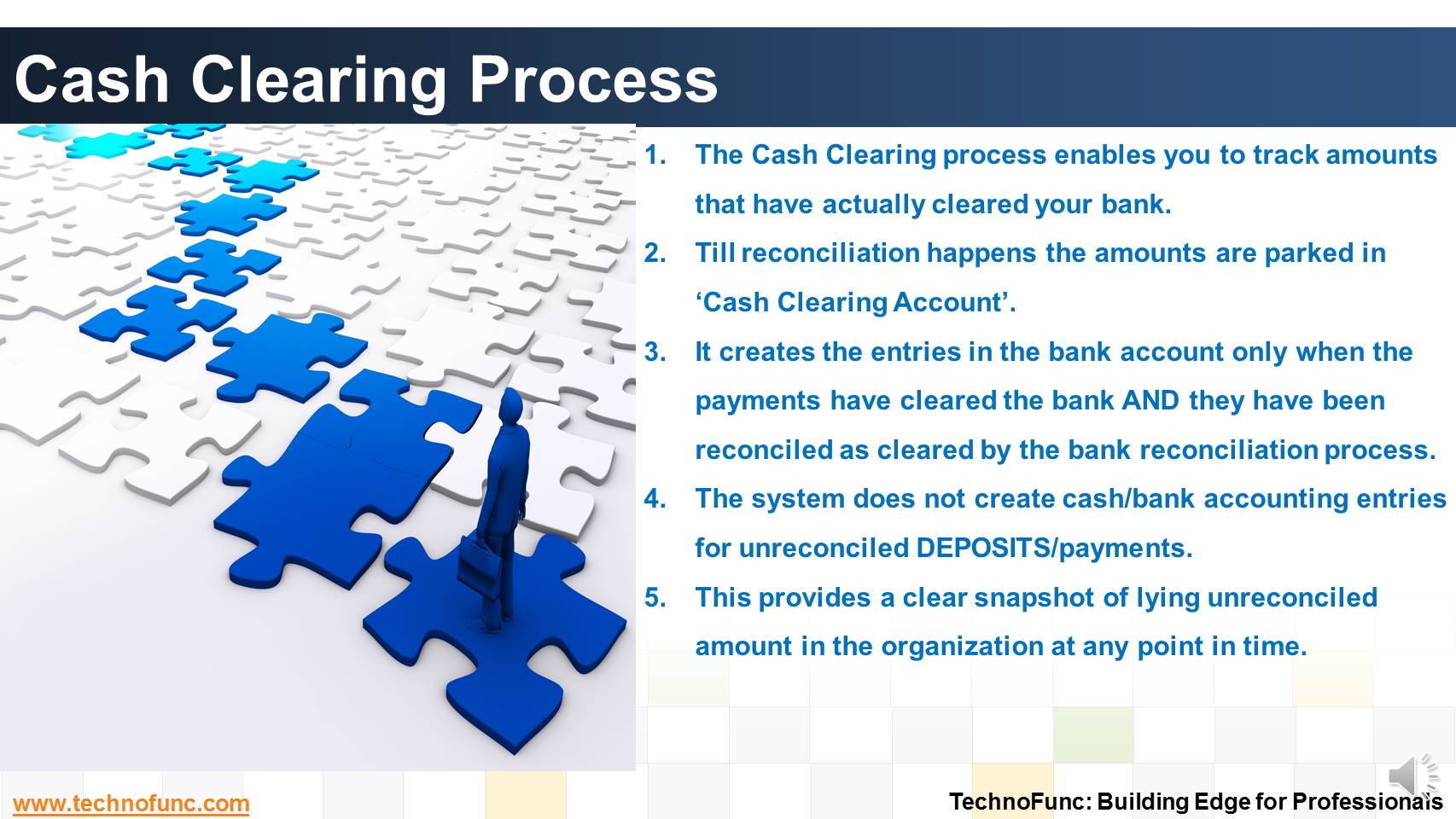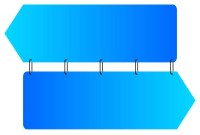- Home
- Business Processes
- Industry Knowledge
- Aerospace Industry
- Automotive Industry
- Banking Domain
- BFSI Industry
- Consumer/ FMCG Industry
- Chemicals Industry
- Engineering & Construction
- Energy Industry
- Education Domain
- Finance Domain
- Hospitality Domain
- Healthcare Industry
- Insurance Domain
- Retail Industry
- Travel and Tourism Domain
- Telecom Industry
- Leadership Skills
- eLearning
- Home
- Functional
- Cash Management
- Cash Clearing Process
Cash Clearing Process
The Cash Clearing process enables you to track amounts that have actually cleared your bank. Till reconciliation happens the amounts are parked in 'Cash Clearing Account'.
Cash Clearing Process
Rather than hitting the bank accounts, in cash clearing systems, the cash/bank transactions are parked in 'Cash Clearing Account'.
Once reconciliation with bank statement is done the reconciled amount is transferred to Cash/Bank Account.
This provides a clear snapshot of lying unreconciled amount in the organization at any point in time.
The Cash/Bank account reflects only the balance that has been reconciled with the transactions of Bank.
The Cash Clearing process enables you to track amounts that have actually cleared your bank versus amounts still floating in the banking system.
The Cash Clearing process creates accounting entries to record the actual settlement in your cash/bank account in general ledger only when you clear the payment transactions in the system during the reconciliation process.
Till reconciliation happens the amounts are parked in 'Cash Clearing Account'.
It creates the entries in the bank account only when the payments have cleared the bank AND they have been reconciled as cleared by the bank reconciliation process.
The system does not create cash/bank accounting entries for unreconciled DEPOSITS/payments.
This provides a clear snapshot of lying unreconciled amount in the organization at any point in time.

Related Links
You May Also Like
-
The topic for this lesson is "Introduction to Cash Management Process". We start with the learning objectives for building requisite functional expertise in cash management process.
-
Bank reconciliation process is targeted to validate the bank balance in the general ledger and explain the difference between the bank balance shown in an organization's bank statement. Learn the reasons for existence of differences between the two.
-
Complete Bank Reconciliation Process
Bank Reconciliation Process is a eight step process starting from uploading the Bank Statement to finally posting the entries in General Ledger. Learn the Eight Steps in Detail!
-
Many different accounts are used in finance. Understand the representation and nature of clearing account in context of accounting, finance and ERP Systems.
-
Bank Reconciliation is a PROCESS to Validate the bank balance in the general ledger With Bank Statement. Learn the bank recon process.
-
Although there is no straight forward answer to the question, how to best organize a treasury function, this article provides an generic view of the way large MNCs creates departments or sub-functions within the treasury function.
-
The terms Treasury Management and Cash Management are sometimes used interchangeably, while, in fact, the scope of treasury management is larger and includes funding and investment activities as well. Learn all about Treasury Management here!
-
How the inflow and outflow of cash is linked to the operating cycles of the business? Learn the cash management process in an enterprize and it's key components.
-
In automated clearing, Bank statement details are automatically matched and reconciled with system transactions. Learn how this process works and what are the perquisites to enable the same.
-
What are the various sources of cash in an organization. Which sources increase the cash available with the enterprise and which sources results in outflow of the cash? Let us explore!
Explore Our Free Training Articles or
Sign Up to Start With Our eLearning Courses

About Us
Learning
© 2023 TechnoFunc, All Rights Reserved










